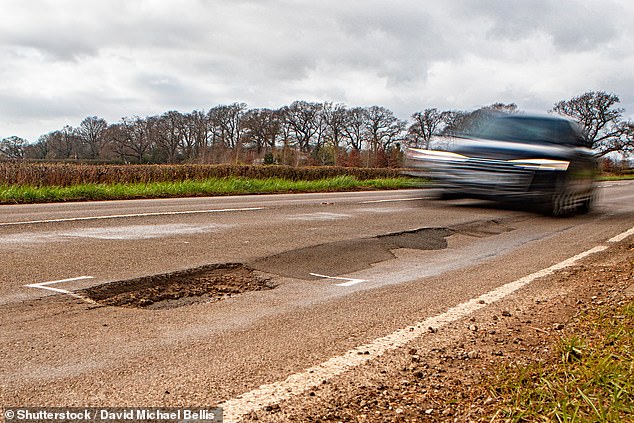Britain’s crumbling road crisis continues with almost 70 per cent of drivers reporting potholes in their area as ‘very severe’ or higher in a new report.
In a further blow to motorists, around 10 per cent of respondents to a poll said craters in their local area are never resolved.
While all areas have pothole problems, the data suggests that those in the South West report the most severe craters of all.

A poll of 2,000 people found that almost 70% describe the pothole crisis where they live as ‘very severe’ or higher, a new report has found

Surveying 2,000 people across the UK, potholes were ranked on a scale of 1 (no potholes) to 10 (extremely severe potholes).
IT found 68 per cent said potholes were ‘bad’ where they live – with 22 per cent categorising the craters as 7/10, 23 per cent putting them at 8/10, 10 per cent saying 9/10 and and 13 per cent reporting potholes at an alarming 10/10.
Only 6 per cent of respondents put their neighbourhood pothole severity at 3 or less on the scale.
Some people in Northern Ireland are very happy with their road surface quality, with the highest number of people saying there are no potholes in their local area – 3 per cent.
However, other residents had contrasting opinions, with 14 per cent extremely severe potholes – which shows the huge disparity between different councils’ road maintenance.

The investigation found a variety of different approaches by 206 local councils when it comes to identifying and repairing potholes
This is Money recently reported how a RAC and Channel 4’s Dispatches expose on whether potholes get fixed or not depends entirely on the council’s own criteria.
What is deemed requiring repair can be wildly different from one region to another, with no nationwide criteria.
The probe found that a third of councils will only fix potholes when they reach a specific depth, irrelevant of how wide they are, meaning many dangerous potholes go unrepaired.
The findings further highlight this, especially in the case of Scotland.
How quickly potholes are fixed in Scotland ranges significantly between different councils within the same city; 21 per cent of respondents in Edinburgh and 10 per cent in Glasgow said potholes were resolved within a month.
Yet, at the same time, 29 per cent of people in Glasgow also said potholes where they live were resolved very slowly, as did 26 per cent in Edinburgh.
Some Glaswegians had it even worse with 11 per cent of respondents in Glasgow saying potholes nearby had never been resolved.


Residents in the South tended to fair better in the pothole postcode lottery, the Moneybarn Finance data suggests.
Potholes in London are fixed relatively quickly, according to survey respondents, with 9 per cent saying potholes in their local area are resolved within a week.
Bristol followed closely, with 6 per cent of respondents reporting similarly prompt resolution times.
Other major English cities including Manchester, Nottingham, Birmingham, Liverpool, and Leeds also featured among the top rankings. In each of these locations, almost 5 per cent of people surveyed said potholes are usually resolved within a week.
This latest report comes after it was revealed in April that the UK’s pothole epidemic is intensifying with the RAC attending 10 per cent more breakdowns resulting from motorists driving through potholes than a year ago.
By the end of March of this year, some 27,205 callouts to breakdowns due to poor road surfaces in the UK were received by the RAC. That compares with 24,906 during the previous 12 months, the motoring services company said.
The RAC has estimated there are more than 1 million potholes in the UK.
Last week, a damning National Audit Office report on the condition and maintenance of local roads discovered that the Department for Transport (DfT) is unaware of the state of English roads after limiting data it collects on local roads to reduce its administrative burden.
The report concluded: ‘There is no reporting requirement for unclassified roads, which make up 62 per cent of the local network, although around 70 per cent of local authorities provided these data in 2023.
‘This means DfT does not hold information for much of the network.’
The DfT spent £1.1bn in the 2022/23 financial year but ‘does not know’ what impact this has had on England’s roads and bridges.
Responding to the audit, Edmund King, AA president, said: ‘The NAO report is a damning indictment of the state of UK local roads and their upkeep. The condition of local roads has been declining yet the backlog is increasing and the budget has fallen.
‘Prior to the election the poor state of the roads was cited by 96 per cent of AA members as the number one transport issue.’

A damning National Audit Office report on the condition and maintenance of local roads last week discovered that the DfT is unaware of the state of English roads after limiting data it collects on local roads to reduce its administrative burden
Concern amongst the road transport industry about the state of UK roads has only grown further after the Chancellor’s said she will delay investment in road infrastructure following overspending by the previous government.
Among the projects being axed is the A303 Stonehenge Tunnel.
Rachel Reeves announced a raft of widespread cuts to plug a ‘£22billion hole in public spending’, which ‘creates more questions than answers about exactly when we’ll start to see the Government improve the condition of Britain’s broken roads,’ RAC head of policy Simon Williams said.
With no mention of whether the cancelled northern leg of HS2 – a £8.3billion fund – will be spent on local road maintenance (as promised by the previous Government), a the next decade-plus funding plan remains unclear.
Williams added: ‘It’s this long-term certainty of funding that local authorities so desperately need to plan long-term maintenance programmes, resurface their worst roads, and carry out preventative treatment that stops potholes forming in the first place.’
Jakob Pfaudler, AA chief executive, said: ‘We understand the Government needs to make savings and we would prefer to see this come from large infrastructure projects such as the A303 Stonehenge Tunnel being delayed rather than from the commitment to fund and fix the roads to remove the scourge of potholes.
‘By far the most important issue for 96 per cent of AA members, in terms of transport policy, is the state of the roads, so while we understand that some longer-term projects will be delayed, we still need the commitment from Government for more long-term, ring-fenced funding for more permanent repairs of our roads.’
Some links in this article may be affiliate links. If you click on them we may earn a small commission. That helps us fund This Is Money, and keep it free to use. We do not write articles to promote products. We do not allow any commercial relationship to affect our editorial independence.









